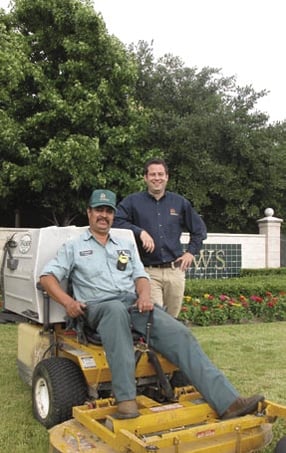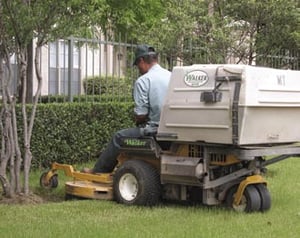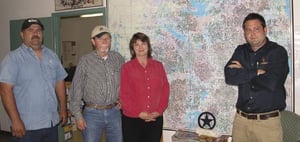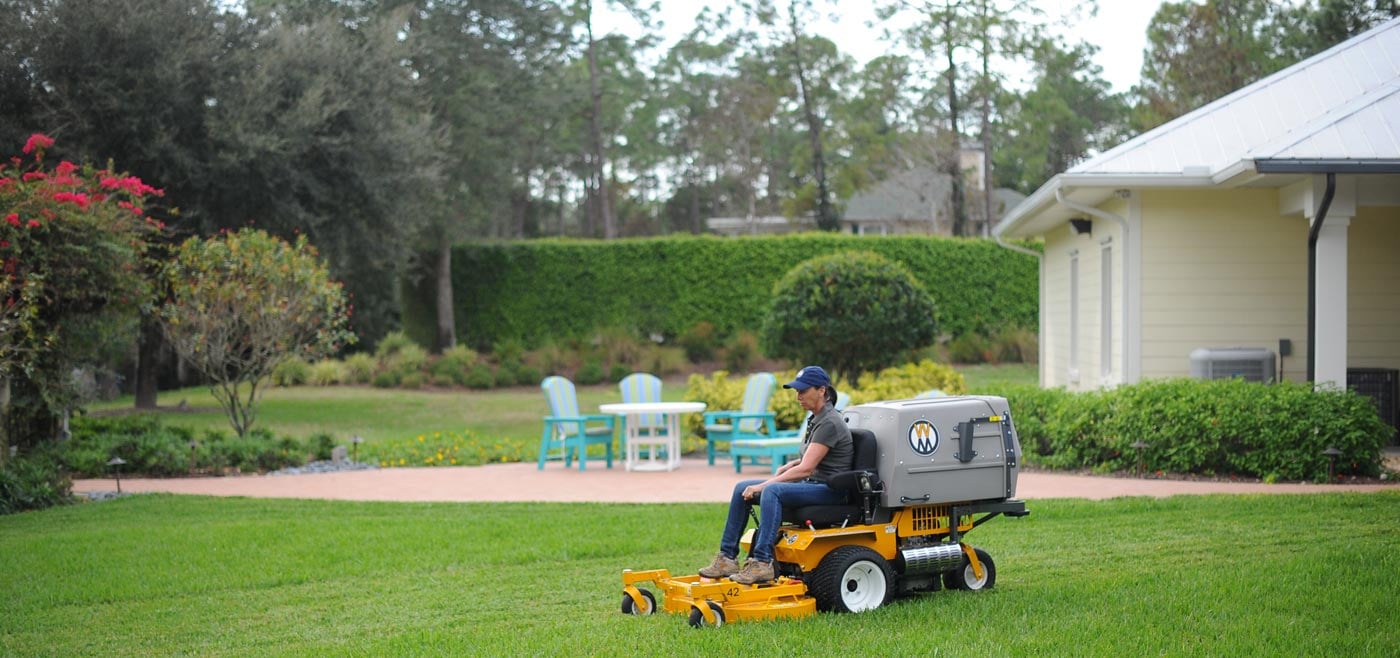Mark Chaffin, owner of Earthworks, Inc., in Lillian, Texas, admits to being a rather low-profile individual who runs a low-profile company. He shies away from the spotlight and his company does very little advertising. In fact, until two years ago, the Earthworks’ name wasn’t even on the sides of its trucks. This may not seem all that unusual until you learn that Earthworks, in business since 1979, employs 200 people, has more than 200 commercial clients, owns 52 trucks, and operates 33 Walker Mowers.
 When asked how his company grew to be so successful with a minimal marketing effort, Chaffin replies, “Quality and never saying no. Our sites do the advertising for us, and our motto is to never say no to a customer. We will do virtually anything clients ask as long as it pertains to the outside of their facility.” Among services Earthworks’ crews provide are maintenance, installation and tree work; they install and repair irrigation systems, and offer hydro-seeding and lawn care services — mostly within the Dallas/ Fort Worth Metroplex area. Company headquarters is located about 30 miles southwest of Dallas; a satellite location was recently completed near DFW airport.
When asked how his company grew to be so successful with a minimal marketing effort, Chaffin replies, “Quality and never saying no. Our sites do the advertising for us, and our motto is to never say no to a customer. We will do virtually anything clients ask as long as it pertains to the outside of their facility.” Among services Earthworks’ crews provide are maintenance, installation and tree work; they install and repair irrigation systems, and offer hydro-seeding and lawn care services — mostly within the Dallas/ Fort Worth Metroplex area. Company headquarters is located about 30 miles southwest of Dallas; a satellite location was recently completed near DFW airport.
Steady Grwoth.... Then Lift Off
Chaffin started his company after leaving the restaurant business. His first mowing account was an apartment complex, and to this day similar properties are the mainstay of his operation. From the very beginning, he practiced his “never say no” motto and delivered on special requests. Take down a sign? “Not a problem,” he would tell customers. If the task was something his crews couldn’t perform, he would subcontract out the service. As the company grew, though, Chaffin brought additional services in-house. Twelve years ago, wife and business partner Mana received her irrigator’s license, giving the company control over the maintenance and installation of irrigation systems. To control the quality of plant material – Earthworks installs 40,000 flats of annual color – the company operates nine greenhouses on its 12-acre property.
The company eventually peaked at between 30 and 35 employees, just the right size for a hands-on owner who was a stickler for quality. To sustain growth, though, the owner knew that something had to change. He had to start delegating more responsibility and broaden the scope of properties his crews were maintaining.
Answering the call, son and now general manager Chris Lee came on board seven years ago. “Chris came in and really made a difference,” says Chaffin. “He started to assume control of the day-to-day operation, and we began to take a new look at the type of properties we maintained. Until then, we had focused primarily on high-end properties, the intent being to keep them looking great. If we wanted to grow, though, we had to expand our niche to include lower-end properties, with the same intent – to make them look great.” Mana agrees, adding that expanding the niche offered a new and different challenge. “Instead of working hard to sustain a property’s high-quality level, we now faced the challenge of giving ‘lesser’ properties a face lift. Still, it was something Mark enjoyed doing. He wanted properties to look their very best, for the clients’ sake and to please himself.”
The strategy worked. What was once steady but slow growth changed dramatically, and within the last six years Earthworks has more than doubled in size. In addition to a bigger market and being able to delegate responsibility, the owner attributes growth to establishing systems that continue to ensure a quality product. His formula involves having the right people in the right place, a program that responds quickly to customer requests, and, of course, having the right equipment to get the job done.
 First Impressions Count
First Impressions Count
Earthworks purchased its first Walker in 1986 after Chaffin had seen the mower at a Dallas landscaping show. “I was impressed with the size of the machine, its weight, and its design,” he remembers. “I knew immediately it would be perfect for our application. End of story.” Chaffin says he couldn’t find a Walker dealer in the Dallas area so he purchased his first Walker Mower from a dealer in Colorado Springs. Since then, though, Dallas-area Walker dealers have supplied Earthworks with three to four mowers every year. To date, the company has 33 Walkers and according to head shop technician Frank Maxey, nearly every one of them is equipped with a 48-inch GHS deck and powered by a 20-hp Kohler engine.
“When you find something that works, you stick with it,” says Maxey. “We’ve tried other brands, but nothing compares to the quality of cut the Walker delivers and they are also easy to maintain.” Lee agrees, adding, “Our guys like the way they maneuver, they are easy to operate, and they are durable. In fact, we have a couple of units that are 15 years old.” He goes on to explain that on average a Walker will get 35 hours a week of use during the growing season, slightly less during the winter months.
“The mowers have never disappointed me,” says Chaffin. “Our clients look at our work and tell us that something about the way their properties look sets us apart from the competition. That something is the crisp, clean look the grass has after being mowed by a Walker.” As important as they are to the operation, though, the Walkers are only part of the company’s quality story. Even more important are the people who operate them and whose responsibility the properties ultimately are.
“I think a big part of our success has so do with how we treat employees,” Lee emphasizes. “We don’t have favorites, here. We treat every employee equally, just like we would want to be treated.” He goes on to say that more than half of the companies 200 employees are H2B workers, many of whom have been coming back to Earthworks for six or seven years.
Training is key, too. The company prefers to operate specialized crews because, as Chaffin notes, “It’s better to be ‘superior’ at doing one thing rather than being ‘good’ at doing several.” Again, he defers to how important quality is to his operation. To control quality, two accounts managers and two field supervisors walk every property at least once every two weeks. Earthworks also employs a training supervisor whose job it is to train new crew members and to actually work on site with a crew that may not be performing up to expectations.
Even then, Chaffin emphasizes that quality can never be taken for granted. “Every employee in the company has authority to fill out a ‘Red Alert’ form that identifies a problem, large or small, with any property we work on. Once the form is filled out, the problem is corrected within 24 hours.”
 The company is also vigilant about safety. All drivers are required to attend a defensive driving class and trucks are thoroughly checked every afternoon when they return from the field. (Company technicians work from 3:00 p.m. to 11:00 p.m.) “When you have more than 20 mowing crews and an equal number of other specialty crews, that’s a lot of checking,” Lee admits. “But having that many trucks on the road results in a lot exposure.” Since it is located right in the middle of Earthworks’ service area, the new satellite location will cut down on some of this exposure and travel time, as well as fuel costs, he adds, noting that most, if not all, the maintenance crews will work out of the DFW office.
The company is also vigilant about safety. All drivers are required to attend a defensive driving class and trucks are thoroughly checked every afternoon when they return from the field. (Company technicians work from 3:00 p.m. to 11:00 p.m.) “When you have more than 20 mowing crews and an equal number of other specialty crews, that’s a lot of checking,” Lee admits. “But having that many trucks on the road results in a lot exposure.” Since it is located right in the middle of Earthworks’ service area, the new satellite location will cut down on some of this exposure and travel time, as well as fuel costs, he adds, noting that most, if not all, the maintenance crews will work out of the DFW office.
When asked what is in store for Earthworks, Chaffin says simply, “More growth. In fact, our plan is to double in size over the next five years.” The new facility is an important part of this strategy, he emphasizes, as is having trained and loyal employees, systems and processes in place, and the right equipment. The cornerstone of this growth, though, is still delivering a quality product and having a “never say no mentality.”




 Site Search
Site Search



